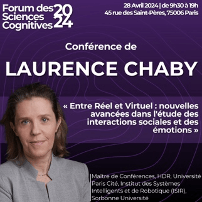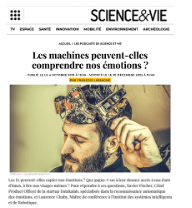Dernières publications sur HAL
- [hal-02422897] Children Facial Expression Production: Influence of Age, Gender, Emotion...par ano.nymous@ccsd.cnrs.fr.invalid (Charline Grossard) le juin 1, 2025 à 16:50
The production of facial expressions (FEs) is an important skill that allows children to share and adapt emotions with […]
- [hal-02423006] Compensating for age limits through emotional crossmodal integrationpar ano.nymous@ccsd.cnrs.fr.invalid (Laurence Chaby) le juin 1, 2025 à 16:50
Social interactions in daily life necessitate the integration of social signals from different sensory modalities. In […]
- [hal-05089113] He must be mad; she might be sad: perceptual and decisional aspects of...par ano.nymous@ccsd.cnrs.fr.invalid (Amandine Guillin) le mai 28, 2025 à 19:00
While the recognition of ambiguous emotions is crucial for successful social interactions, previous work has shown that […]
- [hal-05086292] Regulation of interpersonal distance in virtual reality: Implications for...par ano.nymous@ccsd.cnrs.fr.invalid (Bozana Meinhardt-Injac) le mai 27, 2025 à 10:44
Objective : Accurately interpreting emotional states from facial expressions is crucial for effective social […]
- [hal-05025409] EXPRESS: How personality shapes gaze behavior without compromising subtle...par ano.nymous@ccsd.cnrs.fr.invalid (Alice Cartaud) le avril 8, 2025 à 15:06
Can personality, known to shape emotional experiences and gaze behaviors, influence the recognition of subtle emotional […]
- [hal-04986507] Warming the Ice: The Role of Social Touch and Physical Warmth on First...par ano.nymous@ccsd.cnrs.fr.invalid (Beatrice Biancardi) le mars 11, 2025 à 14:48
First impressions are critical in shaping social interactions, with perceptions of interpersonal warmth playing a […]
Présentation
L’efficacité de nos interactions sociales dépend de la combinaison des signaux sociaux, notamment le visage, le regard, la voix, la posture, etc. Une mauvaise identification, une expression erronée ou une mauvaise interprétation de ces signaux sociaux générer des comportements inadaptés dans la vie quotidienne.
Maître de conférences – HDR, mon programme de recherche se trouve au carrefour des sciences cognitives affectives, de la neuropsychologie, des interactions humain-machine et du traitement du signal social social. Il vise à comprendre le rôle des émotions dans la perception sociale et les interactions sociales. Il s’agit de comprendre comment les humains décodent et produisent les signaux sociaux au travers les expressions faciales, le regard, la voix, la posture, la distance interpersonnelle ou le toucher interpersonnel. J’explore comment ces processus évoluent tout au long de la vie ou varient en fonction de caractéristiques individuelles, par exemple dans certains syndromes cliniques ou en fonction des traits de personnalité.
En tant qu’enseignante dans le service de psychophysiologie-neurosciences, je suis passionnée par l’enseignement de compétences transférables à mes étudiants. Celles-ci vont de l’initiation à la recherche jusqu’aux neurosciences cognitives avancées, couvrant les programmes de licence et de master.
Activités scientifiques
Thèmes de recherche
- Cognition sociale et Interactions sociales
- Émotion et signaux sociaux (visage, regard, prosodie, distance interpersonnelle, posture, toucher)
- Interaction humain-machine
- Vieillissement normal et pathologies neurodégénératives
Publications
2025
Moneger, J., Chaby, L., Besche-Richard, C., & Vergilino-Perez, D. (2025). The effects of exposure to pleasant and unpleasant stimuli on body posture: A systematic review and meta-analysis. Psychophysiology, 62(1), e70126. https://onlinelibrary.wiley.com/share/author/IQD3KRIUBEEWRAMG3DND?target=10.1111/psyp.70126
Meinhardt-Injac, B., Boutet, I., Chaby, L., von Castell, C., & Welsch, R. (2025). Regulation of interpersonal distance in virtual reality: Implications for socio-emotional functioning in late adulthood. PLoS One, 20(5), e0323182. https://journals.plos.org/plosone/article?id=10.1371/journal.pone.0323182
Cartaud, A., Vergilino-Perez, D., & Chaby, L. (2025). How personality shapes gaze behavior without compromising subtle emotion recognition. Quarterly Journal of Experimental Psychology, 17470218251334118. https://journals.sagepub.com/doi/abs/10.1177/17470218251334118
Biancardi, B., Vigilant, M., Lefour, P.L., & Chaby, L. (2025). Warming the Ice: The Role of Social Touch and Physical Warmth on First Impressions in Virtual Reality. In The 32nd IEEE Conference on Virtual Reality and 3D User Interfaces. [paper] https://hal.science/hal-04986507/ – 🎬
2024
Pavic, K., Vergilino-Perez, D., Gricourt, T. & Chaby, L. (2024). Age-related differences in subjective and physiological emotion evoked by immersion in natural and social virtual environments. Scientific Report 14, 15320 (2024). https://doi.org/10.1038/s41598-024-66119-5
Biancardi, B., & Chaby, L. (2024). Rôle du toucher social dans la formation d’impressions: de l’interaction humaine à l’expérience virtuelle. WACAI’24-Workshop sur les “Affects, Compagnons Artificiels et Interactions”(ACAI). https://hal.science/hal-04613529
Guedjou, H., Boucenna, S., Chaby, L., Cohen, D., & Chetouani, M. (2024). The influence of extraversion on a robot developmental learning in a human robot interaction. IEEE International Conference on Development and Learning (ICDL). https://hal.science/hal-04590176/
Younsi, N., Pelachaud, C., & Chaby, L. (2024). Beyond Words: Decoding Facial Expression Dynamics in Motivational Interviewing. IEEE International Conference on Computational Linguistics, Language Resources and Evaluation, LREC-COLING 2024, 2365-2374. https://aclanthology.org/2024.lrec-main.211.pdf
Lebert, A., Vergilino-Perez, D., & Chaby, L. (2024). Keeping distance or getting closer: How others’ emotions shape approach-avoidance postural behaviors and preferred interpersonal distance. Plos One, 19(2), e0298069. 10.1371/journal.pone.0298069
2023
Guillin, A., Chaby L., Vergilino-Perez, D. (2023). He must be mad; she might be sad: perceptual and decisional aspects of emotion recognition in ambiguous faces, Cognition and Emotion, 37(8) 1376-1385. 10.1080/02699931.2023.2258585
Pavic, K., Vergilino-Perez, D., & Chaby, L. (2023). La réalité virtuelle, un atout majeur pour l’étude des émotions en contexte social: intérêts, applications et perspectives. Revue pratique de la prospective et de l’innovation, 7(1), 32-35. https://hal.science/hal-04084226
Pavic, K., Chaby L., Gricourt T., Vergilino-Perez, D. (2023). Feeling Virtually Present Makes Me Happier: The Influence of Immersion, Sense of Presence and Video Contents on Positive Emotion Induction. Cyberpsychology, Behavior, and Social Networking, 26(4), 238-245. 10.1089/cyber.2022.0245
2022
Chaby, L., Benamara, A., Pino, M., Prigent, E., Ravenet, B., Martin, J.C., Vanderstichel, H., Becerril-Ortega, R., Rigaud, A.S., Chetouani, M. (2022). Virtual patients as a simulation-based framework for training clinician-patient communication skills: an overview of their use in psychiatric and geriatrics care education. Frontiers in Virtual Reality, 3:827312. https://doi.org/10.3389/frvir.2022.827312
Pavic, K., Vergilino-Perez, D., Gricourt, T., Chaby, L. (2022). Because I’m happy – An overview on fostering positive emotions through virtual reality. Frontiers in Virtual Reality, 3:788820. https://doi.org/10.3389/frvir.2022.788820
Becerril-Ortega, R., Vanderstichel, H., Petit, L., Urbiolagallegos, M. J., Schoch, J., Dacunha, S., … & Chaby, L. (2022). Design Process for a Virtual Simulation Environment for Training Healthcare Professionals in Geriatrics. Springer International Publishing, 101-127. https://link.springer.com/chapter/10.1007/978-3-030-89567-9_6
2021
Lebert, A., Chaby, L., Guillin, A., Chekroun, S., & Vergilino-Perez, D. (2021). Are You “Gazing” at Me? How Others’ Gaze Direction and Facial Expression Influence Gaze Perception and Postural Control. Frontiers in psychology, 6145. https://doi.org/10.3389/fpsyg.2021.730953
Pavic, K., Oker, A., Chetouani, M., & Chaby, L. (2021). Age-related changes in gaze behaviour during social interaction: An eye-tracking study with an embodied conversational agent. Quarterly Journal of Experimental Psychology, 74(6), 1128-1139. 10.1177/1747021820982165
Grondin-Verdon, M., Younsi, N., Grimaldi, M., Pelachaud, C. I., Chaby, L., & Canamero, L. (2021). Induction of the being-seen-feeling by an embodied conversational agent in a socially interactive context. 21st ACM International Conference on Intelligent Virtual Agents, IVA GALA, 1-2. https://hal.science/hal-03342893
2020
Grossard, C., Dapogny, A., Cohen, D., Bernheim, S., Juillet, E., Hamel, F., … & Chaby, L. (2020). Children with autism spectrum disorder produce more ambiguous and less socially meaningful facial expressions: an experimental study using random forest classifiers. Molecular Autism, 11(1), 1-14. 10.1186/s13229-020-0312-2
Lebert, A., Chaby, L., Garnot, C., & Vergilino-Perez, D. (2020). The impact of emotional videos and emotional static faces on postural control through a personality trait approach. Experimental Brain Research, 1-10. https://hal.sorbonne-universite.fr/hal-03162345
Lebert, A., Vergilino-Perez, D. & Chaby, L. (2020). For a better understanding of the mutual relationships between emotion and posture. Revue de Neuropsychologie. 12(1), 11-18. https://hal.science/hal-02484418
2019
Perrault, A., Chaby, L., Bigouret, F., Oppetit, A., Cohen, D., Plaza, M., & Xavier, J. (2019). Comprehension of conventional gestures in typical children, children with autism spectrum disorders and children with language disorders. Neuropsychiatrie de l’Enfance et de l’Adolescence. 67(1), 1-9. https://doi.org/10.1016/j.neurenf.2018.03.002
2018
Grossard, C., Chaby, L., Hun, S., Pellerin, H., Bourgeois, J., Dapogny, A., Ding, H., Serret, S., Foulon, P., Chetouani, M., Chen, L., Bailly, K., Grynszpan, O., and Cohen, D. (2018). Children facial expression production: influence of age, gender, emotion subtype, elicitation condition and culture. Frontiers in Psychology. 9:446 https://doi.org/10.3389/fpsyg.2018.00446
2017
Xavier, J., Magnat, J., Sherman, A., Cohen, D., & Chaby, L. (2017). A developmental and clinical perspective of rhythmic interpersonal coordination: from mimicry toward the interconnection of minds. Journal of Physiology. 420–426. https://doi.org/10.1016/j.jphysparis.2017.06.001
Chaby, L., Hupont, I, Avril, M., Luherne-du Boullay, V. & Chetouani, M. (2017). Gaze behavior consistency among older and younger adults when looking at emotional faces. Frontiers in Psychology. 8:548. https://doi.org/10.3389/fpsyg.2017.00548
Cohen, D., Grossard, C., Grynszpan, O., Anzalone, S., Boucenna, S., Xavier, J., Chetouani, M. & Chaby, L. (2017). Autisme, jeux sérieux et robotique : réalité tangible ou abus de langage ? In Annales Médico-psychologiques. 175:5, 438-445. https://doi.org/10.1016/j.amp.2017.03.013
Grossard, C., Hun, S., Serret, S., Grynszpan, O., Foulon, P., Dapogny, A., Bailly, K., Chaby, L. & Cohen, D. (2017). Rééducation de l’expression émotionnelle chez l’enfant avec trouble du spectre autistique grâce aux supports numériques : le projet JEMImE. Neuropsychiatrie de l’Enfance et de l’Adolescence. 65(1), 21-32. https://doi.org/10.1016/j.neurenf.2016.12.002
2015
Xavier, J., Vignaud, V., Ruggerio, R., Bodeau, N., Cohen, D., & Chaby, L. (2015). A Multidimensional Approach to the Study of Emotion Recognition in Autism Spectrum Disorders. Frontiers in Psychology. 6:1954. 10.3389/fpsyg.2015.01954
Giannitelli, M., Xavier, J., François, A., Bodeau, N., Laurent, C., Cohen, D., & Chaby, L. (2015). Facial, vocal and cross-modal emotion processing in early-onset schizophrenia spectrum disorders. Schizophrenia research, 168(1), 252-259. https://doi.org/10.1016/j.schres.2015.07.039
Chaby, L., Luherne-du Boullay, V., Chetouani, M. & Plaza, M. (2015). Compensating for age limits through emotional crossmodal integration. Frontiers in Psychology. 6:691. https://doi.org/10.3389/fpsyg.2015.00691
Templier, L., Chetouani, M., Plaza, M., Bélot, Z., Boquet, P & Chaby, L. (2015). Altered identification with relative preservation of emotional prosody production in patients with Alzheimer’s disease. Geriatrie Psychology Neuropsychiatrie Vieillissement, 13(1), 106-115 https://hal.inrae.fr/UPMC/hal-02423022v1
2014
Luherne-du Boullay, V., Plaza, M., Perrault, A., Capelle, L., & Chaby, L. (2014). Atypical crossmodal emotional integration in patients with gliomas. Brain and Cognition, 92, 92-100.
Plaza, M., Capelle, L., Maigret, G., & Chaby, L. (2014). Strengths and weaknesses of multimodal processing in a group of adults with gliomas. Neurocase, 19(3), 302-312.
2013
Plaza, M., du Boullay, V., Perrault, A., Chaby, L., & Capelle, L. (2013). A case of bilateral frontal tumors without “frontal syndrome”. Neurocase, 1-13.
du Boullay, V., Plaza, M., Capelle, L., & Chaby, L. (2013). Identification of emotions in patients with low-grade gliomas versus cerebrovascular accidents. Rev Neurol, 169(3), 249-257.
2012
Chaby, L., Chetouani, M., Plaza, M., Cohen, D. (2012) Exploring multimodal social-emotional behaviors in autism spectrum disorders. Workshop on Wide Spectrum Social Signal Processing, IEEE Social Computing, 950–954.
2011
Vannetzel, L., Chaby, L., Cautru, F., Cohen, D., & Plaza, M. (2011). Neutral versus emotional human stimuli processing in children with pervasive developmental disorders not otherwise specified. Research in Autism Spectrum Disorders, 5(2), 775-783.
Narme, P., Bonnet, A.M., Dubois, B., Chaby, L. (2011). Understanding facial emotion perception in Parkinson’s disease: the role of configural processing. Neuropsychologia, 49(12), 3295–3302
Chaby, L., Narme, P. & George, N. (2011). Older Adults’ Configural Processing of Faces: Role of Second-Order Information. Psychology and Aging, 26(1), 71-9.
Avant 2009
Guillaume, C., Guillery-Girard, B., Chaby, L., Lebreton, K., Hugueville, L., Eustache, F., & Fiori, N. (2009). The time course of repetition effects for familiar faces and objects: An ERP study. Brain Research, 1248, 149-161.
Chaby, L., & Narme, P. (2009). Processing facial identity and emotional expression in normal aging and neurodegenerative diseases. Geriatr Psychol Neuropsychiatr Vieil, 7, 31–42.
George, N., Jemel, B., Fiori, N., Chaby, L. & Renault, B. (2005). Electrophysiological correlates of facial decision: Insights from upright and upside-down Mooney-face perception. Cognitive Brain Research, 24(3), 663-673.
Chaby, L., George, N., Renault, B. & Fiori, N. (2003). Age-related changes in brain responses to personally known faces: an event-related potential (ERP) study in humans. Neuroscience Letters. 349, 125-129.
Chaby, L., Jemel, B., George, N., Renault, B. & Fiori, N. (2001). An ERP study of famous face incongruity detection in middle age. Brain And Cognition, 45(3), 357-377.
Fiori, N., Chaby, L., & George, N. (2001). Gender differences in the neural bases of face processing and recognition: Two ERP studies. International Journal of Psychophysiology, 41(3), pp. 221-232.
Jemel, B., George, N., Chaby, L., Fiori, N. & Renault, B. (1999). Differential processing of part-to-whole and part-to-part face priming: an ERP study. NeuroReport, 10, 1069-1075.
Vulgarisation scientifique




Responsabilités collectives
- Depuis 2024. Membre du Conseil de l’École Doctorale ED261-3CH
- 2017-2025. Membre du Conseil Académique Local
- 2008-2025. Membre du Conseil de Gestion
- Depuis 2022. Membre de la Commission Parcoursup
- Membre de la Commission Pédagogique de Licence

